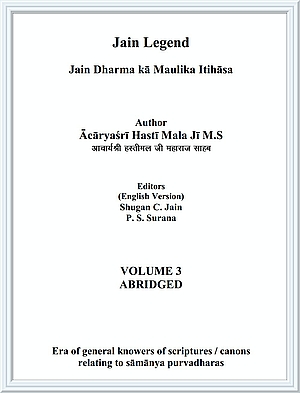- Āpta Mīmāṃsā or Devāgama.
- Svayaṃbhū stotra or Caturviṃśati Jina stuti
- Stuti Vidyā
- Yuktyanuśāsana
- Ratna Karaṇḍa Śrāvakācāra.
Ācārya Śiva Śarmā
By writing the two jewels like great texts namely 'Kampapayadi' and 'Paṃcama Śataka', an ancient Ācārya had done immense beneficial work for Jain followers. He took out the essence of the 'Karma Prakṛati Prābhṛata' of the second prior canon from Dṛaṣṭivāda to compose 'Kammapayadi', a text on the karma doctrine of Jainism. The version available at present of 'Kammapayadi' is considered as one of the oldest holy Jain text. This text is considered with equal veneration by both Digambara and Śvetāmbara traditions. It had 475 verses. Ācāryas of later period have written bhāṣyas, cūrṇis, and ṭīkās etc on this text.
Ācārya Śiva Śarmā had also compiled 'Paṃcama Śataka' on the basis of this 'Kammapayadi' holy text. This text however has 111 verses. Many ācāryas of later period have also written bhāṣyas, cūrṇis and ṭīkā on this text as well.
Both these holy texts work as the light house for directing /guiding the practitioners on the spiritual path of purification.
Influential composer of holy texts, Dharma Dāsa Gaṇi Mahattara, contemporary of Hārila
Only one text called 'Upadeśamālā' authored by Dharma Dāsa Gaṇi Mahattara is available today. This text by him is very beneficial for the practitioners of spiritual path of purification. This text has 544 verses. Jain literature of later times such as in Doghaṭṭīvṛatti', it had been told that in his life as householder, Dharma Dāsa Gaṇi was King Vijaya Sena of Vijayapura. He had two queens Ajayā and Vijayā. Queen Vijayā gave birth to a son who was named as Raṇa Siṃha. Under the influence of the fear co-wife of Vijaya Siṃha, she created a deceitful act and had son Raṇa Siṃha abducted. This pain of loss of son greatly affected both King Vijaya and queen Vijayā. They both renounced the world and got initiated in Jain monkhood and accepted the practice of five major vows. Later on this King Vijaya was known as Dharma Dāsa Gaṇi.
On the other hand, Prince Raṇa Siṃha was being brought up in a farmer family. On becoming an adult, he captured the Kingdom of Vijayapura due to his valour and bravery.
Later on he became anti religion and started inflicting cruelty on his subjects and started earning de-meritorious karmas. When Dharma Dāsa Gaṇi came to know of this, he composed 'Upadeśamālā' to bring back his son on the religious path from the sinful one. To bring back Raṇa Siṃha on the virtuous path, he sent Jina Dāsa Gaṇi and female monk Vijayaśrī to deliver sermons to Raṇa Siṃha. On arriving in Vijayapura, they both started delivering sermons to Raṇa Siṃha based on 'Upadeśamālā'. These sermons based on Upadeśamālā had great and desired effect on Raṇa Siṃha. He became a pure laity and believer of the creed (samyaktvadhārī). Later on, he anointed his son to the throne and accepted Jain monk initiation with Ācārya Muni Candra.
 Acharya Hasti Mala
Acharya Hasti Mala
